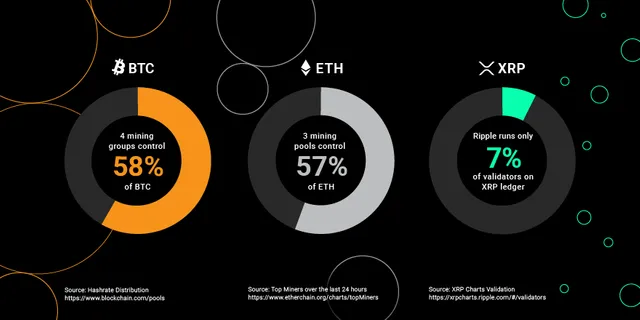The XRP Ledger Is Now Fully Decentralised According To Ripple CTO
Honest decentralisation has always been a talking point for Ripple and XRP. The problem within Ripple has been that as a company, they own an awful lot of XRP and historically have maintained a number of control points within the XRP ledger, calling to question the legitimacy of XRP’s decentralisation. Now as we know, through the migration of nodes over the past few weeks, the XRP ledger has become more and more decentralised. This is a sentiment now confirmed by David Schwartz, Ripples Chief Technology Officer.
In his latest report The Inherently Decentralised Nature of XRP Ledger Schwartz argues that through Ripples consensus protocol, XRP is now totally decentralised. According to Schwartz:
“The XRP Ledger uses a consensus protocol that relies on a majority of validators to record and verify transactions without incentivizing any one party (this is one of the main reasons why I began working on XRP Ledger more than six years ago). Validators are different from miners because they aren’t paid when they order and validate transactions. Today, these validators operate at locations across the globe and are run by a broad range of individuals, institutions, asset exchanges and more. Put simply, the XRP Ledger is based on an inherently decentralized, democratic, consensus mechanism — which no one party can control.”
As a part of this, Schwartz has compared the control that these validators could take of the network to Bitcoin and Ethereum, which as per the report, 58% of the Bitcoin network is controlled by just 4 mining pools and 57% of the Ethereum network is controlled by just 3 mining pools, compared to 7% of the XRP network which is controlled by Ripple. In essence, nobody on the Ripple network has this sort of dominance or majority as we are seeing in Bitcoin and Ethereum.

“The XRP Ledger requires 80 percent of validators on the entire network, over a two-week period, to continuously support a change before it is applied. Of the approximately 150 validators today, Ripple runs only 10. Unlike Bitcoin and Ethereum — where one miner could have 51 percent of the hashing power — each Ripple validator only has one vote in support of an exchange or ordering a transaction.”
Moreover:
“The XRP Ledger is and always has been inherently decentralized because the users always retain the freedom to change their UNLs and the corresponding validators that they trust. For example, if a party controlling a large number of validators abused that power to propose changes that served only its own interests, users operating nodes could simply remove the party’s validators from their UNLs and rely on other validators that more closely represented their interests.”
All things considered, it seems as if the XRP ledger is now at a point of total decentralisation. We disagree with Schwartz when he says that the ledger has always been this decentralised but either way, things are changing at Ripple and things are changing for XRP, it’s a good thing that the network is seeing an increase in decentralisation as this is something that will no doubt make XRP attractive to new users, giving RippleNet a new use value and of course, helping the project to continue to grow at its current and stunning rate.
Full article: https://cryptodaily.co.uk/2018/08/the-xrp-ledger-is-now-fully-decentralised-according-to-ripple-cto/